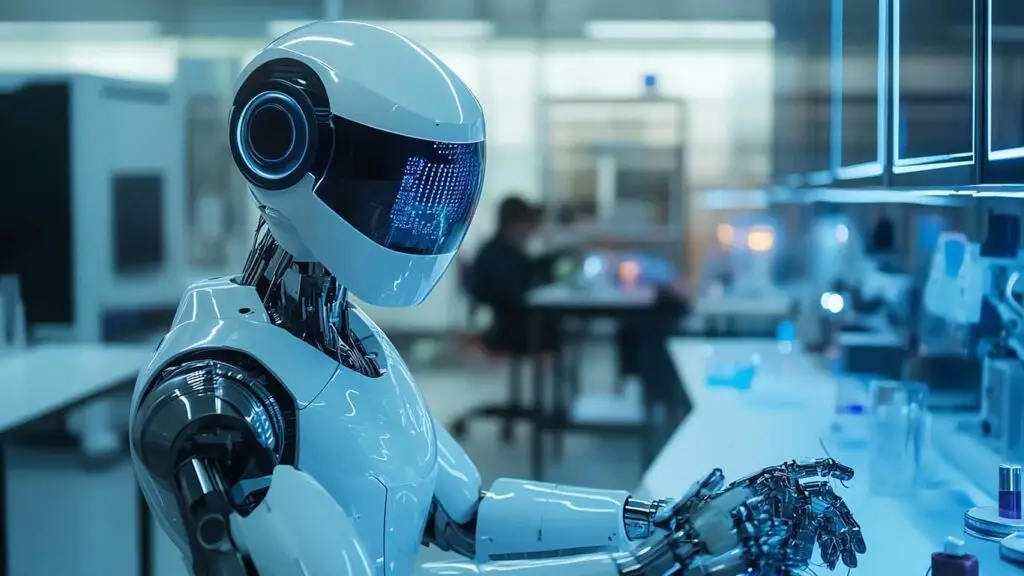Artificial Intelligence (AI) is no longer a distant possibility—it is actively shaping how we live, work, and do business. From automating repetitive tasks to enabling human-machine collaboration, AI is transforming workplaces across industries. Business leaders, employees, and organizations alike must adapt to this shift in order to stay competitive in the evolving digital economy.
AI is fundamentally transforming the healthcare landscape by introducing innovative solutions that not only enhance the quality of care but also make it more accessible and efficient. Through machine learning algorithms and data-driven insights, AI enables healthcare providers to diagnose and treat diseases with unparalleled accuracy.
“AI won’t replace people—but people who use AI will replace those who don’t.”
AI and the Evolution of Work
AI has already started reshaping the traditional 9-to-5 structure. Businesses are using intelligent tools to:
- Automate data-heavy processes
- Improve decision-making with predictive analytics
- Create smarter workflows through machine learning
- Enhance collaboration with AI-powered assistants
This shift is changing job roles, reducing mundane tasks, and allowing employees to focus on creative, analytical, and strategic work.
SEO Keywords: future of work AI, how AI is changing jobs, AI workplace automation, AI and human collaboration
AI-Powered Productivity: Doing More with Less
AI tools increase efficiency by eliminating repetitive tasks such as scheduling, reporting, and data entry. For instance:
- AI Assistants: Automate meetings, emails, and customer queries.
- Predictive Analytics: Anticipate market trends and customer needs.
- Workflow Automation: Streamline supply chains and HR operations.
This means employees spend more time on high-value tasks that require human judgment and creativity.
SEO Keywords: AI productivity tools, AI workplace efficiency, AI automation in business
New Job Roles in an AI-Driven World
While some fear that AI will replace jobs, the reality is that it is creating new opportunities and career paths. Emerging roles include:
- AI Business Strategists
- Data Scientists and AI Trainers
- AI Ethics and Compliance Officers
- Human-AI Collaboration Managers
AI is not eliminating work—it is transforming work into something more innovative, specialized, and impactful.
SEO Keywords: AI job creation, future careers in AI, AI and employment, new AI-driven roles
Reskilling and Upskilling: Preparing for the AI Future
The rise of AI makes reskilling and lifelong learning essential. Business leaders must invest in training programs that empower employees to:
- Work with AI tools
- Understand data-driven decision-making
- Enhance soft skills like leadership, creativity, and emotional intelligence
Organizations that prioritize reskilling will build future-ready teams capable of thriving in the AI-powered workplace.
SEO Keywords: AI reskilling, future skills AI, AI workforce training, AI learning for business leaders
Human + AI Collaboration: The Future of Decision Making
The true value of AI lies in augmenting human intelligence, not replacing it. Businesses that embrace collaboration between AI systems and human expertise can:
- Make faster and more accurate decisions
- Personalize customer experiences
- Innovate with data-driven strategies
AI doesn’t remove human value—it enhances it, creating a workplace where people and machines work hand in hand.
SEO Keywords: human-AI collaboration, AI in decision making, AI for business leaders
Ethical AI and the Workforce of Tomorrow
With great power comes great responsibility. Business leaders must ensure that AI adoption respects ethics, transparency, and fairness. Responsible AI builds trust and ensures sustainable growth by:
- Avoiding algorithmic bias
- Protecting employee and customer data
- Aligning AI adoption with human values
SEO Keywords: ethical AI in workplace, responsible AI adoption, AI trust and transparency
Conclusion: Thriving in the AI-Powered Workplace
The future of work is not about humans versus machines—it’s about humans empowered by machines. Organizations that embrace AI responsibly, invest in reskilling, and foster human-AI collaboration will thrive in the new economy.
The question isn’t “Will AI change the way we work?”—it already has. The real question is: “Are you ready to lead in the AI-powered future of work?”



